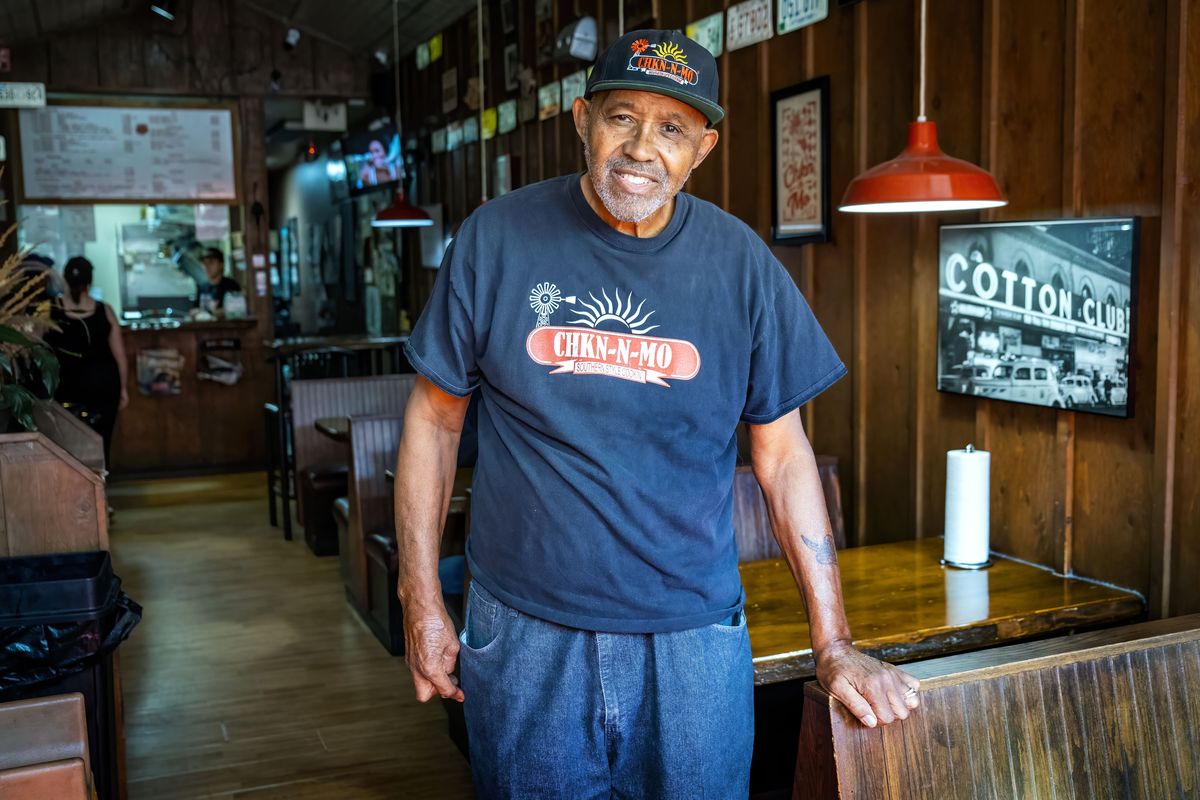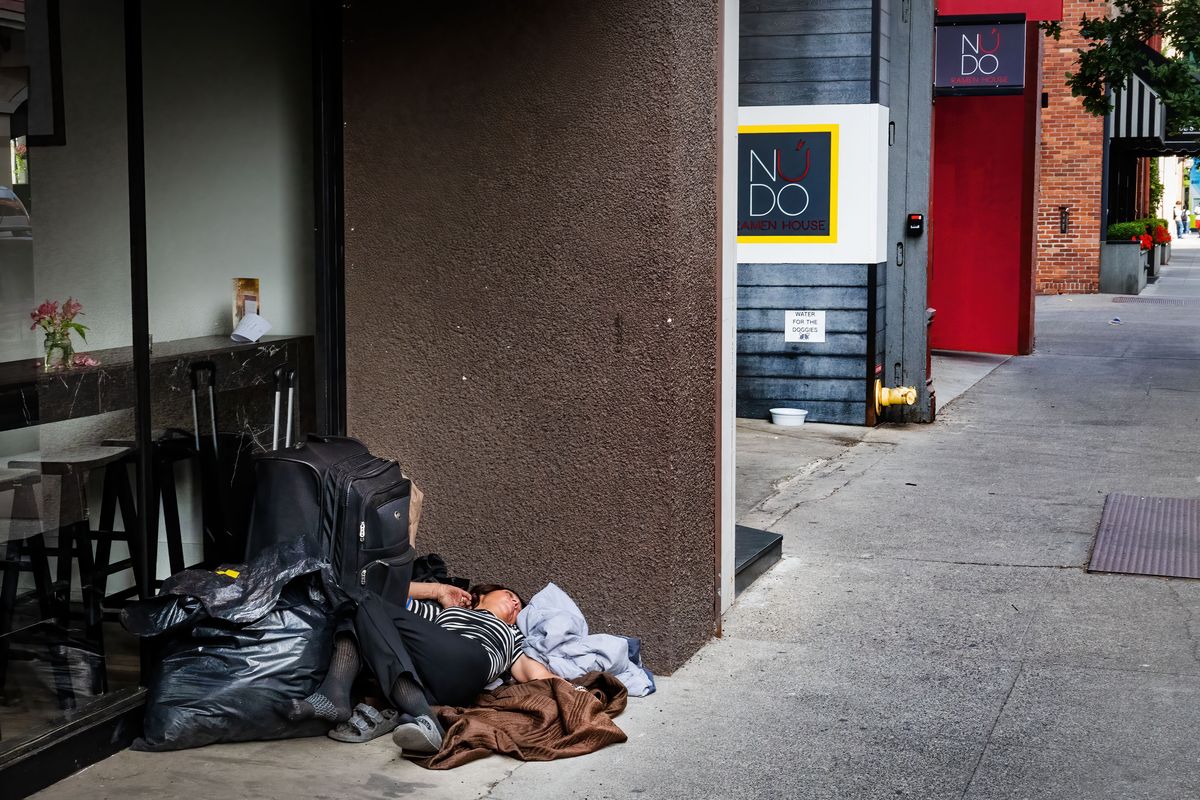Fed-up business leaders decry Spokane’s homelessness problem after Zona Blanca announces closure
A woman sleeps on the sidewalk across from the Historic Davenport Hotel on West Sprague Avenue in September 2024 in downtown Spokane. (Colin Mulvany/The Spokesman-Review)
Spokane business leaders used the impending closure of a downtown restaurant Monday as a call to arms for elected leaders to begin finding a solution to the homelessness problem.
City Councilman Jonathan Bingle spoke at an event organized by various business advocates, including developer Larry Stone’s recently minted Spokane Business Association, at James Beard-semifinalist chef Chad White’s Zona Blanca Ceviche Bar, which is closing later this month.
The event became a packed-house affair, with more than 100 people pushing into the serving area at 157 S. Howard St. Bingle apologized to the assembled business groups in the crowded room, saying that elected leaders have not done enough to enforce the law. He railed against the “cultivation of lawlessness” that “crushes dreams” of local business owners, and called for the city to enforce its open public drug use laws, the anti-homeless camping law approved by voters last year through the city’s Proposition 1, and respond more quickly to graffiti.
“What hope does the average citizen have in the city of Spokane if our most driven entrepreneurs can’t make it?” Bingle asked. “What message does that send to the rest of us? This cannot be the Spokane that we accept.”
The assembled crowd included a who’s who of conservative lawmakers, business leaders and advocates, including former Mayor Nadine Woodward, County Commissioners Al French and Josh Kerns, developer Jordan Tampien and others.
White cited downtown crime in a recent announcement that the ceviche bar would be closing.
“We as a community have to work together beyond just our elected officials,” White said Monday. “I will admit I became very numb to what has gone on around our business.”
White has previously estimated that the business has been broken into over 20 times since he has operated in that location, including twice in August. While he will be closing the ceviche bar, he will continue operating out of the space with a catering business and host pop-up restaurant events.
“It doesn’t matter what side of the aisle we are on; we have to come together in the center and help Spokane grow and thrive, or restaurants like this and many more will close,” White said.
Bobby Brett, who with his brothers owns the Spokane Chiefs and Spokane Indians, said that his wife no longer likes to come to Spokane’s downtown. Brett owns the building, at 157 S. Howard St., that will remain Zona Blanca until Sept. 29.
Brett, who also owns several apartment buildings in Spokane, said the homeless situation continually makes it difficult for businesses, like Zona Blanca, to remain successful.
“I think the last five to seven years, it’s gotten progressively worse,” Brett said. “I believe, from being a downtown property owner, it’s the worst it’s ever been and it’s getting worse.”
The railroad viaduct near the Howard Street building was cleaned up about an hour before the crowd gathered for Bingle’s news conference.
Brett said it can be problematic for a young family walking beneath that viaduct when it’s packed with homeless people.
“It’s open drug use, and it’s just not pretty,” Brett said. “Why would you do that when you can go to the South Hill and drive into a nice restaurant?”
The stated problem hasn’t translated into more criminal reports. In all of Spokane, reported crime dropped from 171,000 calls by this time in 2023 to 166,000 in 2024.
Brett believes those statistics are misleading.
“I think if you are a politician, of course you want to say crime is down. But for those of us who own property and spend time downtown … it’s just not true that crime is down,” he said.
The situation has led to less foot traffic, and the effect has caused business owners to pay more to remain viable.
“The reality is, you’ll have vandalism, and you don’t even call your insurance company. You just deal with it,” Brett said. “Our insurance rates are skyrocketing downtown. That’s due to property damage.”
While Bingle, White and Brett suggested that falling rates of reported crime in the area were a mirage, the Spokane Police Department has also reported a steep increase in enforcement. Arrests for all crimes have shot up in 2024, up from 5,008 by the end of August in 2023 to 6,339 so far this year.
While citations under last November’s Proposition 1 didn’t begin until August, with city officials citing a U.S. Supreme Court case that could have complicated enforcement and only concluded in late June, citations for unlawful camping have jumped this year from 916 in 2023 to 2,845 thus far in 2024.
Spokane’s new police chief, Kevin Hall, encouraged residents and business owners to continue to report crimes so that the city can better understand the reality on the ground.
“Without that information, we have a harder time in making those determinations,” Hall said.
Brett thinks Spokane’s elected leaders need to do more.
“To me, with the city, it’s got to be a priority,” he said. “In other cities where it is a priority, like Coeur d’Alene, they don’t have a problem. It’s got to be a priority.”
Mayor Lisa Brown argued Monday that laws are being enforced to the best ability of the police department and code enforcement, despite budget and staffing constraints.
She noted that her administration, which began in January, has created a dedicated code enforcement team focused only on downtown and pointed to the newly launched street medicine team and her June emergency declaration to respond to the opioid abuse on Division Street.
“This administration is very committed to community safety, and we’ve shown that despite the budget crisis,” Brown said.
When asked how the city should pay to ramp up enforcement given its current budget problems, Bingle pointed to last year’s failed Measure 1, a countywide initiative which would have raised sales taxes to bring in an estimated $1.7 billion over 30 years to pay for, among other things, a new jail.
“If we didn’t have a strong opposition to our jail measure last year by certain current elected officials in the city of Spokane, had that passed, then we would have already been addressing a substantial portion of our current budget issues,” Bingle said.
Brown, who opposed that initiative last year, argued it failed because of a lack of a clear plan for how the money would be used and an unwillingness by voters to write a large check to the county without more details.
“To be clear, the public in the county rejected it pretty significantly,” Brown said.
She argued that a future initiative would need to not only focus on the courts, jail and police, but on mental health and addiction treatment services in order to be successful.
Hall, who was recently hired away from the Tucson, Arizona, police department, took issue with the claim that the city was allowing crime to proliferate.
The new chief noted that the suspect charged with burglarizing Zona Blanca was arrested within five hours of the break-in and remains in jail.
He added that Spokane is not alone in facing the surge of fentanyl and the accompanying crime.
“Fentanyl was a game changer,” he said. “Fentanyl changed the landscape of addiction science and the unsheltered population, and we are just now starting to catch up to that in both public health and public government.”
Hall argued that adapting to that new situation needs to be multifaceted.
“The sort of myopic view that there’s only one way to approach any problem isn’t, in my mind, productive,” Hall said. “There’s no silver bullet, there’s no one solution to this very complex problem, and I do believe it’s going to take collaboration.”
“Right now, I see some components of the community who want to do that,” he continued, “and some components of the community who do not. But until we’re ready to get there, I’m not sure what we’re going to be able to accomplish.”
While city leaders dispute the best way to address the issue, Emilie Cameron, president and CEO of the Downtown Spokane Partnership, said the organization is working with its members to do what it can.
“When we think about our businesses, they employ our neighbors and they host our celebrations,” Cameron said. “This is where we make memories together. It’s where we gather. I hear day in and day out that they are struggling more today than they did in 2020 or 2021.”
While homelessness in itself is not a crime, some persons on the street may be blocking business entrances or walking paths used by customers moving through downtown.
“Those in the throes of drug use or mental illness may be aggressive or threatening,” she said. “Those are the types of behaviors that contribute to it.”
She said the event at Zona Blanca highlights how the problem can affect the success of a downtown.
“When you think about Chad and the culinary credentials he brought to our city, those are intangible things,” Cameron said. “Today was a clear call to action from our business community. We are urging our elected leaders to work together on issues that are plaguing the downtown and the city as a whole.”
Brown said that larger economic and social trends are working against downtown businesses, particularly the transition away from people working five days a week in downtown office spaces, decreasing foot traffic in the area.
She hopes that initiatives in the city to increase housing downtown, including by converting empty office spaces, will help activate downtown spaces that have become increasingly abandoned.
Barry Barfield, administrator of the Spokane Homeless Coalition, thanked Bingle for hosting the event.
“I get it. Folks are really upset about this one restaurant,” Barfield said. “But (the problem) is bigger than cops showing up and Zona Blanca.”
Barfield said too many government agencies are trudging forth with different ideas.
“We need a regional collaborative effort,” Barfield said. “I believe that homelessness would be better served by a regional collaborative response, and that criminal justice would be better served by a regional collaborative response. The criminal justice system is just as fractured, siloed, multifaceted, polarized and contentious as homelessness.”
While he didn’t attend Monday’s news conference, Chicken-n-Mo owner Bob Hemphill said he’s seen enough to understand the concerns of other downtown businesses.
“When I moved here in ’76, you could see the greatness that this city had to offer,” he said. “There were so many jobs, it was just so unique, so much fun.”
He opened Chicken-N-Mo in 1992. But since the coronavirus pandemic, Hemphill said he has watched crime increase and his restaurant’s popularity decrease.
“I’ve had people follow me and I’ve gotten in fights with people,” he said. “It’s gone to hell. I know it has, but I’m not leaving.”
As he sat at a high-top table, Hemphill said he remains steadfast that he will continue operating his business at 4141/2 W. Sprague Ave.
“I got a lot of friends down here. A lot of people know me,” he said. “When I come down, somebody’s always saying, ‘Hey, Bob, how are you doing?’ ”
Hemphill said he believes the Lilac City will find its way.
“Spokane will take off again because it’s a great city,” he said.
Reporter Tod Stephens contributed to this report.


